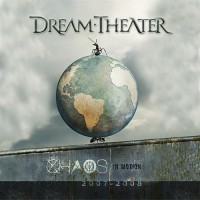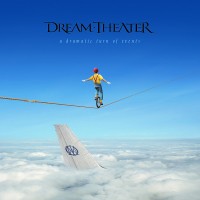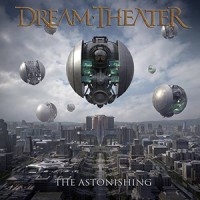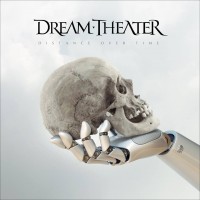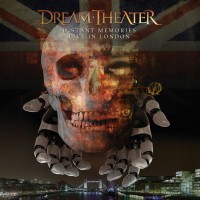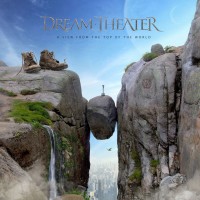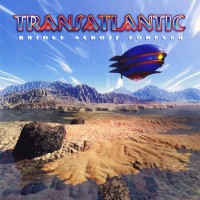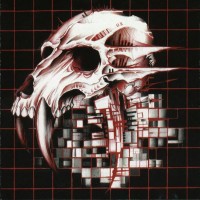Getting Into: Dream Theater

| Written by: | Roman Doez |
| Published: | February 20, 2022 |
After the recent release of their 15th album, A View From The Top Of The World, it's safe to say Dream Theater have established themselves as one of the longest running and most influential bands in progressive metal, a genre they trailblazed in the late 80s and early 90s when everything was yet to be done. This article will cover their evolution in detail, going over the good, the bad, the wonderful and the miserable that they have produced, as a way for people who do not know anything about them to find the release that fits their tastes the most. Let's get started.
After the formation of the band in 1985 by drummer Mike Portnoy, bassist John Myung, guitarist John Petrucci, keyboardist Kevin Moore and singer Chris Collins, Majesty released their first demo in 1986. Yes, you read that right, Majesty. The demo was pretty well received, and they were getting a little reputation in the underground at the time. For their first full-length, Chris Collins was thanked and replaced by another singer: Charlie Dominici, accompanied by a name change to Dream Theater.
Dream Theater's debut is quite an oddball in their discography. The first noticeable difference is of course the vocals, as Charlie Dominici sounds nothing like his successor, and that makes Dream Theater feel like a completely different band. In addition to that, the production is quite weird to say the least. The bass is way too loud and all the instruments overall sound pretty odd. It's definitely a unique release in the Dream Theater catalog, and yet it has a lot of charm. The poor mix doesn't take away from the album's raw energy. They were young and had a lot of ideas, and the tracks definitely show that.
"A Fortune In Lies", "Status Seeker", "Ytse Jam", I would go as far as to say every song here is pretty good, but none really nears perfection. When Dream And Day Unite actually sounds closer to a mix of prog and hard rock than to a mix of prog and metal, something amplified by the very obvious Rush influences. Sometimes the songs are quite cheesy, like the beginning of "Status Seeker", sometimes they abruptly shift in rhythm for no reason and that just doesn't really sound good. But despite all of its flaws, this is a pretty cool album! Not a masterpiece by far, but a guaranteed good experience.
Let down by the lack of success their debut garnered, Dream Theater were hard at work to raise the bar for their second release. Charlie Dominici was swapped for James LaBrie, who would become the permanent voice of Dream Theater. In 1992 was thus released Images And Words.
There are 8 tracks here, split into two main categories: the ballads and the "real" prog metal ones. One major problem though: Dream Theater are not good at ballads. At all. Thankfully, that only concerns two tracks here, "Another Day" and "Surrounded". They're rather cheesy and simple, and quite underwhelming compared to the progressive songs, although they're much better than some of the ballads the quintet would make on subsequent releases. Thankfully, they only make up for 9 minutes out of the 57 the album lasts, and boy are the remaining 48 a treat.
"Pull Me Under" is the big hit of the album, and arguably their most famous song. It's quite a fun one to listen to, but definitely the weaker out of the prog ones. Then you have "Take The Time", a very diverse, eclectic and overall fantastic tune. The remaining songs though, "Metropolis - Part I", "Under A Glass Moon" and "Wait For Sleep / Learning To Live": now THIS is prog. The tracks are (relatively) long, complex and evolving, all the while staying coherent and of course with godsend instrumental sections, not to mention, LaBrie's incredible vocals and the amazing production job. "Learning To Live" especially feels like an odyssey and perfectly succeeds at being the band's very first epic. These elements are the backbone of Images And Words, and the reason why the album is still so renowned to this day.
Shortly after Images And Words, Dream Theater released their first ever live album.
Now this release is weird. It's one of the band's shortest outputs, not even reaching 50 minutes, and the set list is pretty odd due to the fact that only two Dream Theater albums were released at that point in time. You've got your obligatory "Pull Me Under", as well as "Metropolis - Part I" and the questionable addition of "Surrounded" from Images And Words. From the debut, they chose to include "A Fortune In Lies" (this is the best version of the song without a doubt) and "The Killing Hand", only it's been extended to 10 minutes. It's a pretty odd choice but not a bad one by any means, just a bit underwhelming compared to the rest of the set list and maybe not the best option off of the debut. And then there's the real outlier, a 6-minute instrumental improvisation called "Bombay Vindaloo". It's a pretty nice track but nothing too special; I just find it odd that they chose to include it in their first ever live album.
All the tracks are played pretty much like on record, and I find LaBrie's voice to fit the debut's tracks much better, which is a good thing to take out of this album. Other than that, there's no real reason to come back to it.
The only thing Images and Words lacks is a good dose of heaviness, and, thankfully, its follow-up is here to fix that. Meet the new Dream Theater, darker and more mature. Most of the joyfulness of Images And Words is gone, leaving us with a sadder and more emotional album. And a better one as well.
Awake is very different from Images And Words, but it still improves off of it in a lot of areas. The production, which was already really good, now is perfect and wonderfully fits the sound and atmosphere of the release; there are way fewer ballads and a lot more ambition. The longest track in the previous release, "Learning To Live", was 11 minutes long. Here, "Scarred" is 12 minutes long, the two interconnected tracks "The Mirror" and "Lie" are together 13 minutes long, and the epic "A Mind Beside Itself" is composed of 3 tracks, for a grand total of almost 20 minutes. Songs this long weren't too common at this point in time in metal; I can only think of a handful of examples from the era, so that was a pretty unique trait, building even more upon their 70's prog influences.
But length doesn't necessary make a track great. And thankfully, Dream Theater knows how to write songs. All the ones I cited are excellent, especially "Scarred" and the second part of "A Mind Beside Itself", "Voices", and a hefty amount of tunes here are classics, like "Caught In A Web" or "Space Dye Vest" among others. This last one is a perfect example as to why so many prefer this era of Dream Theater: Kevin Moore's soft and emotional touch. But Awake remains a metal album, and quite a heavy one in some parts, as Petrucci uses his seven-stringed guitar to pull out some deeper and heavier riffs, and on this release they never miss. The solos and instrumental sections are not on the same level of technicality and madness as on Images And Words, but that's to be expected with this album being more atmospheric, and that ultimately is a perfect fit for an already excellent release, cementing it as a classic of prog metal.
The long tracks that Dream Theater had made at this point were all really good, but the 20-minute epic "A Mind Beside Itself" felt a bit disjointed. It was only natural that, after all this time, a "real" 20 minutes epic would come, and it would not disappoint. Despite the departure of Kevin Moore, he was quickly replaced by Derek Sherinian, and the band could promptly get back to the studio.
This is, however, not an album, it's an EP. A 58-minute long one, but still, an EP. The point of its existence is simple: to release the track "A Change Of Seasons", one they had been working on for several years. It's an excellent track and, simply put, one of the best tunes Dream Theater have ever made, if not one of the best songs of all time. It transitions from section to section without ever feeling disjointed, with fantastic instrumental parts more reminiscent of the "proggier" parts of their early career (Images And Words more so than Awake), top-notch vocals from LaBrie even after the infamous random shrimp event, and all-round phenomenal songwriting. The theme of the song is pretty touching; it's about Portnoy's mother, who passed away in a plane crash. All of these elements just merge together to make a coherent, emotional and simply wonderful track that I cannot recommend listening to enough.
But this song is only 25 out of the 58 minutes of the EP, what's the rest comprised of? Well, my friend, if you know me, you know I like covers. And fortunately, the rest of this EP is a bunch of covers they recorded live. While not being the best things they've ever made, these are all really good.
While the covers are not the most important parts of Dream Theater's discography, the title track is more than essential and a prog classic.
After each album reaching new heights and getting more and more ambitious every time, there was only one logical step to follow up a 25-minute long track: a concept al- wait, what do you mean a more commercial-oriented release?
This album is riddled with problems, but they all lie in the more "commercial" tracks. "Hollow Years" and "Take Away My Pain" are already painful enough, but rock bottom is hit with "You Not Me". These tracks don't really sound like Dream Theater, they're a weird mix of ballads and awkward poppy choruses that do not blend well together at all.
However, despite this album being nowhere near the level of quality of the releases surrounding it, there's still some quite good stuff to be found. "Hell's Kitchen", the 13 minutes epic "Trial Of Tears" or even "Just Let Me Breathe" are more than enjoyable. And even with the more commercial approach, Falling Into Infinity still gets into some pretty heavy territory for Dream Theater standards of the time, with "New Millenium", "Peruvian Skies" and "Burning My Soul". But the real highlight of the album is "Lines In The Sand", one of the most emotionally intense tunes Dream Theater ever made. Though the mix is pretty weird, it leaves some space for the bass to shine, something not nearly as present in other Dream Theater releases.
So, while the highs are pretty high, they're (mostly) nowhere near the ones hit on previous releases, and the downright abysmal lows do not help this record in any way. But still, the majority of what we are presented with is really good and rather worthwhile. It's a different Dream Theater, but it's still Dream Theater.
Now that they had a few records under their belt, it was time for a second live album, and this one would be something else.
Nearing 2h40, now THIS is a live release. The set list is very good, with lots of tracks from every album apart from the debut (which is not that big of a loss), for example "Voices", "Take The Time", "Peruvian Skies", "Scarred" and "Lines In The Sand". It's just an all-round really great choice of tracks, especially with the addition in between the songs of the different parts of "A Change Of Seasons" to spice everything up, as well as little Easter eggs sprinkled throughout, like the "Force Theme" from Star Wars at the beginning of "Voices", or random solos from each band member being played every now and then; it's little things like these that make live records fun to listen to. Not every track is fantastic though; I don't really know why they chose to include "Hollow Years" or "Take Away My Pain", for example.
And of course it's a Dream Theater record we're talking about, so the execution is top-notch. But where the fun really begins is when they start adding new stuff to songs, with for example the solo from Lynyrd Skynyrd's "Free Bird” at the end of "Take The Time", or "Peruvian Skies", which has parts of "Enter Sandman" and "Have A Cigar" in it. Sadly though, there's an important issue with this release, and it is LaBrie, whose voice isn't at its best, and it sometimes feels like he's struggling a lot (e.g. "Take The Time"); however, it's definitely not a deal breaker.
This is Dream Theater's first really successful live release, and definitely not the last. Although it might seem very long, the choice of the tracks, and the little variations and whatnot here and there, make it entirely worth it.
Dream Theater's last album of the 90's would mark a drastic change, as keyboardist Derek Sherinian was replaced by the final piece of the puzzle: Jordan Rudess.
This new keyboardist would mean a complete change in their sound, to make something truly new and quite incomparable to the band's earlier output. Metropolis Pt. 2: Scenes From A Memory is heavier and more ambitious than what preceded it. It would not only see Dream Theater master everything they had already been doing perfectly, but also do what was thought to be impossible: actual good ballads.
The near entirety of the track list is composed of fan favorites, and that's for a good reason. You've got sick riffs and sick melodies with awesome instrumental parts, amped up by Rudess and Petrucci's excellent dynamic within the solos, while Portnoy and Myung support the whole thing with their more-than-amazing playing, and even a top-tier vocal performance by LaBrie. Couple that with some brilliant production work and the band sounds like a real ensemble here, not musicians each doing their thing. Add a really strong concept tying everything up together and justifying the length of the tracks and of the output as a whole, and every single minute shines, making the album's seemingly long duration of 1h17 fly by before you even realize what happened. There is truly something to be found for everyone, and Metropolis Pt. 2 is most definitely a resounding success in everything it tries to do, placing it among metal's greatest albums ever put out, and definitely earning Dream Theater a place in the metal pantheon (if that place wasn't already earned).
This last release was a massive hit, "so why not play the whole album live?" the band figured, and what a wonderful idea that was.
If you thought the last live album was too short, first off, what's wrong with you? And second off, rejoice, as this one is nearly 3h10 long, a half-hour more than last one, and that length is entirely justified, as the set list is the definition of a 10/10. You've got the entirety of Metropolis Pt. 2 followed by (among others) "Metropolis Pt. 1", "The Mirror", "Just Let Me Breathe" [band]Liquid Tension Experiment[band]'s "Acid Rain" (we're eventually going to talk about them, don't worry). Furthermore, the last three tracks are "A Mind Beside Itself" (including what is by far the best version of "The Silent Man"), "Learning To Live" and "A Change Of Seasons". If that isn't the most incredible ending to a show, I don't know what is. The only outlier would be "Another Day", but it's a fan favorite so I'll let it pass.
And as you may expect, much like the last album, it's played perfectly with a few more treats here and there (the very Pink Floyd-ish "John & Theresa Solo" in the middle of Metropolis, Portnoy going mental on his drum kit at the end of "Finally Free", the fun Easter eggs in the middle of "A Change Of Seasons"...). Once again, as is the case with a lot of Dream Theater's live albums, the only problem is LaBrie and his struggling vocals, which thankfully do not shatter the experience in any way.
Dream Theater again proved that they were not joking around in their live performances, making what might as well be my favorite live album ever, a three goddamn hours long masterpiece showcasing everything the band is capable of.
After the resounding success that was Metropolis, Dream Theater decided to, for the 4th time, amp up the craziness and ambition of their releases, this time with a double album. Side one would be pretty regular, but side two was one continuous 42-minute long track, their longest to date.
Disc one is comprised of 5 tracks. The first four are all at least 9 minutes long, with "The Glass Prison" and "The Great Debate" nearly reaching the 14 minutes mark. These four songs are very unique compared to what Dream Theater has previously done, and some are quite a bit heavier than usual, with "The Glass Prison" one of the heaviest Dream Theater tracks, in addition to being one of the very best. The three next tunes are lighter, something that does not by any means diminish their quality, as they're all pretty experimental and expand a lot on Dream Theater's sound. The 5th song, "Disappear", is sadly a pretty dull and uninteresting ballad that doesn't do anything new and tarnishes an excellent disc.
Fortunately, there is still the second disc, the 42 minutes of "Six Degrees Of Inner Turbulence", and boy, what a track we have here. It's separated into eight sections, each of them very different from the others, yet coherent within the greater ensemble of the song. It goes from happy ("About To Crash - Reprise"), to sad ("Goodnight Kiss", which is a remarkably not bad ballad), to heavy ("War Inside My Head" / "The Test That Stumped Them All"), even to a bit cheesy ("Solitary Shell" and its questionable choice of synths), all the while staying absolutely wonderful and engaging. The only complaint I have would be the aforementioned weird synths in "Solitary Shell", everything else is just executed perfectly.
As a whole, this is an extraordinary album, once again reaching new heights for the band, but the occasional cheese as well as the rather boring "Disappear" prevent it from being as good as what preceded it.
After yet another success, Dream Theater decided to tone it down a notch on being more ambitious every time. This time, no 20-minute track, no concept album, just pure unadulterated Dream Theater... except there's a twist. They settled on a much heavier sound for this release, and when I say much heavier, I mean much heavier.
While Metropolis Pt. 2 saw the band mastering everything they already knew how to do and even more, and Six Degrees focused on the more experimental side of things, Train Of Thought gets back to basics with pretty long yet rather standard tracks, and that's not a bad thing at all. All of them are perfectly paced and they've upped their solo game here, because boy we're getting into some really wanky territories and very long instrumental sections, culminating in their longest, and potentially greatest instrumental: "Stream Of Consciousness". And in addition to just being really great, these songs are all pissed, allowing the band to get in some much rawer territories with for example the very groovy "As I Am", or "Honor Thy Father" and its opening riff that pulverizes you with how goddamn brutal it is compared to your usual Dream Theater material.
And as to not make the release boring, there's some variation in there, notably with the aforementioned instrumentals as well as with the short, sweet and sad ballad "Vacant" or the ‘fake ballad’ that is "Endless Sacrifice". It's not a lot of variation, but it's enough to keep your interest up for the whole hour the album lasts. The rest of the tracks are just Dream Theater exploring their newfound heaviness as much as they can, and it works fantastically. There are no weak tracks on Train Of Thought; it's a perfect example of consistency in a release, placing it near the very top of the band's discography.
It's been too long without a live album, so let's fix that. Last one was 3h long and the one before it was 2h30 long, so this time they picked the middle of the road option with a 2h45 album, a very respectable length.
But sadly, the 2h45 are not entirely justified, as the set list is lacking in the Six Degrees department. For some reason they chose to include "Goodnight Kiss", "Solitary Shell" and "Disappear" instead of "The Glass Prison" or "Misunderstood", something I don't understand. These tracks, paired with a surprisingly good version of the otherwise rather lacking "Hollow Years", as well as with a total absence of Awake tunes and an overabundance of Falling Into Infinity tracks make for not the best set list ever... And that's pretty much my only gripe with the album.
The rest of the songs here are all wonderful, from "As I Am" to "War Inside My Head / The Test That Stumped Them All", "Pull Me Under", the best version of "Beyond This Life" (with an insane build-up that I cannot get enough of), not to mention the fantastic "Instrumedley" (a mix of every instrumental they had written before Train Of Thought, plus some "Metropolis Pt. 1" in the middle); almost every track they played deserves to be here, and compromises need to be made for a band with seven albums, so the lack of a lot of fan favorites is a normal thing (although I still do not understand why there's so much Falling Into Infinity material). And for once, I actually think LaBrie's vocals are good here! Not one time does he struggle as he used to, he's definitely back in shape. And the final positive point I would like to mention is the mix; it's surprisingly good and makes the bass pop up quite a lot, something I'm particularly fond of.
After the overdose of heaviness that was the last album, Dream Theater opted for a lighter direction for their 8th output, the aptly titled Octavarium. However, this approach turned out to be double-edged. Out of the eight tracks here, three are ballads. You know my opinion on [band]Dream Theater[band]'s ballads, and these ones do not deviate from the rule. "The Answer Lies Within" is incredibly forgettable, while "These Walls" and "I Walk Besides You" are simply quite bad. Thankfully, it's only three songs, and the other five are much better.
"Sacrificed Sons" and "Never Enough" are pretty good, nothing too special here. They're not bad by any means, although the first one drags on for a bit too long, but all in all they're both pretty enjoyable tracks. "The Root Of All Evil" and "Panic Attack" though, now that's what I like to hear. Both of them are really good, with intricate instrumental sections, sick riffs and some pretty nice vocal delivery. They're both pretty heavy compared to the rest of the songs, although coming nowhere near Train Of Thought levels, and not really nearing that album's level of quality either. But the final track, "Octavarium", is the reason why this album is held so high up in a lot of people's esteem. It's 24 minutes long, and it could very well be their magnum opus. It shifts through quite a wide array of moods, starting rather calm and peaceful, then going into some more intense territories. And unlike their previous epics, it does not feel like several interconnected parts put together really well, but rather one continuously evolving track. It's simply an excellently crafted song that never loses focus and develops a lot of different ideas across its 25 minutes.
This is a very contrasted album, somehow reaching both the highest highs and lowest lows the band has ever seen, and I genuinely don't understand how it is possible. But it's still a relative failure after the three masterpieces they released in a row.
Another album, another live one! And would you look at that it's back to a 2h30 length. This time, in a similar fashion to Metallica, they chose to play their show with an orchestra (on discs 2 and 3), and that was a pretty... Interesting idea.
To start off, there is one thing that impresses me on this album and this thing surprisingly is LaBrie. His vocals are genuinely so good here, he shines throughout the whole performance, hitting the high notes he was able to reach back in the Images And Words and Awake era. This might as well be the Dream Theater release where he shines the most.
And the set list is pretty good! "The Root Of All Evil" and "Under A Glass Moon" are definitely the best inclusions out of disc one, along with the deep cuts that are "Another Won" (a song from the Majesty era) and "Raise The Knife" (from the Falling Into Infinity demos). I'm however not the biggest fan of "Innocence Faded" and "I Walk Beside You", which could have been replaced by better tracks from their respective albums.
Disc two and three have quite a lot going for them. The whole 40 minutes of "Six Degrees Of Inner Turbulence" as well as the 24 of "Octavarium" and the 10 of "Metropolis" are by far the best tracks on the whole release, while on the other hand "Vacant" and especially "The Answer Lies Within" are far from being featured in my ideal Dream Theater set list. There's also a problem unique to this release: it's the orchestra. The whole gimmick of this album is to have them and they don't really do anything apart from on "Six Degrees" and maybe "Vacant", rendering them pretty useless. But it's still an overall great live album, although it doesn't differentiate itself from the other ones as much as it could have. I can definitely see myself come back to these versions of "Six Degrees" and "Octavarium".
Sadly, after all this time without a genuinely bad album, it had to happen at some point or another.
Systematic Chaos is the representation of everything not working within Dream Theater. The songs are too long for their own good ("The Ministry Of Lost Souls", "In The Presence Of The Enemies - Part II") or too simple and boring ("Forsaken", "Constant Motion" and "The Dark Eternal Night"), the production is nothing special and most of the tracks are forgettable. Even the good tracks are nowhere near the level of anything released beforehand.
There are of course, as I just stated, some okay and even good tracks in there, namely "In The Presence Of Enemies - Part I" (definitely the best song here by quite a margin), "Repentance", "Prophets Of War" (this one is just alright, would probably have been a better fit for Octavarium) and the second half of "In The Presence Of Enemies - Part II" (first half isn't all that interesting), but they don't do anything new, they kind of sound... empty. They're definitely enjoyable, but I don't really hear anything of note in them. They're bland and devoid of the interesting parts Dream Theater tracks usually have, leading to this Systematic Chaos overall not being all that memorable and interesting amidst Dream Theater's rather varied discography.
But thankfully, they still decided to make a live album. Sadly, it's not really on par with the other ones.
You know the drill, this is Dream Theater, this release is 2h30 long. Let's address the first issue I have here: the set list. Now I know that this was released right after Systematic Chaos so it's logical that several of its tracks are featured, but they're far from the most-high quality tunes the band had in stock. Playing the underwherlming "Constant Motion", "The Dark Eternal Night", "Forsaken" and "The Ministry Of Lost Souls" wasn't the band's best decision. Moreover is a 15-minute long version of "Surrounded", which is not a necessarily bad addition but still a pretty odd one. The rest of the set is pretty good though, with "Panic Attack", "Blind Faith", "Lines In The Sand", "Scarred" and "Take The Time" among my favorites here, in addition to the really cool medley "Schmedley Wilcox".
As usual, the tunes are played perfectly with some additional bits here and there, longer solos and all that, you know the drill, though I'd argue that these additional bits sometimes come off as unnecessary, as is the case with the final solo of "Take The Time", which goes a bit too over the top and somewhat denatures the track. And sadly, this time, LaBrie's vocals aren't all that good, sometimes even reaching a point where they become annoying. That problem is not helped by the mix, which is all over the place, for the simple reason that each track is recorded in a different location, so recreating the exact same mix is practically impossible. But still, that doesn't excuse the fact that it's so muffled and weirdly compressed like that, it's far from the best thing they could have done.
Still, this is a pretty fun album to listen to, and I'd recommend you to at least check out "Schmedley Wilcox" and maybe the 15-minute version of "Surrounded" if you're interested, but it's definitely not the best one you could spend your time listening to.
Thankfully, Dream Theater got back on track.
After several albums in a row with more but (relatively) shorter tracks, Dream Theater chose to up the ante for this one: 75 minutes in only six tracks. Only two of them are under the ten minutes mark, with "Wither" and "A Rite Of Passage" being respectively five and eight minutes long, while the four other tracks range from 12 to 19 minutes. And while usually an album being this long would lend itself to many flaws, here the longer tracks feel entirely justified, while the two shorter ones actually end up being the least interesting, with "Wither" not really serving any purpose and "A Rite Of Passage" just feeling like the band is on auto pilot; there's nothing special happening in it but it's pretty fun nonetheless.
As to the really good tunes, the one that takes the most advantage off of its length is coincidentally the best one on the album, "A Nightmare To Remember". It takes time to breathe, to develop its ideas in some surprisingly short 16 minutes. "The Shattered Fortress" is given the hard task to close the "12 Steps Suite", something it does pretty well, although it's definitely one of the weaker elements of said suite, and "The Best Of Times" is a ballad of some sort, dedicated to Portnoy's father, who passed away while the album was being made. It's a very emotional and tearful remembrance of a lost one, one that never fails to hit right where it wants to. Finally comes "The Count Of Tuscany", a 20-minute epic. I've got mixed feelings on this one; the first half is really amazing while the second one is a bit less interesting, but it's still overall more than enjoyable. In addition is an awesome special edition containing several covers, and you know I love covers.
Black Clouds And Silver Lining is a pretty by-the-numbers album for Dream Theater, but that might as well be one of its biggest strengths, as it stays consistently enjoyable the entirety of its run time.
The aptly titled A Dramatic Turn Of Events came out after founding member Mike Portnoy left the band, quite a shocking event for the band that had a very big impact on their songwriting.
This album is sadly a failure at pretty much everything it tries to do. The songs are bloated, incoherent and seem to go nowhere, the choruses are awful and ruin the pace of said songs, and the mix isn't all that good. The tracks themselves are mostly uninteresting, only two or three standing out from the rest. "Breaking All Illusions" is clearly the better one of the bunch, and yet it feels like there's something missing in it, as it doesn't flow well at all. The transitions seem random and the song overall feels unfinished, and it's quite a shame because it clearly had a lot of potential to shine as a great Dream Theater track. I would honestly love to see them turn it into a 20-minute epic, where it could really take its time to develop its ideas without ever feeling disjointed and rushed like it currently does.
"Lost Not Forgotten", "Bridges In The Sky" and maybe "Outcry" on a good day are pretty nice/alright tracks, but still they feel disjointed and incoherent most of the time. And the rest of the album is just so... eh. "On The Backs Of Angels", "This Is The Life" and "Far From Heaven" are forgettable, there is nothing of note happening there, and on the other hand, I'm clearly not ready to forget how pitiful "Build Me Up, Break Me Down" and "Beneath The Surface" were. It's pretty sad to see how this album turned out to be, given all the potential there was in there to do something great.
After the failure that was last album, Dream Theater chose the bold way of the self-titled release, and it worked... To some extent.
On a good part of this output, it feels like the band is on autopilot. Of the nine tracks, only three really stand out (we will come back to them later), because the remaining six sound very similar. These six tracks are pretty generic and not really all that interesting, but thankfully none are bad, which is something not every Dream Theater album can pride itself in. Sadly though, the production is pretty bad.
There are three tracks however that stand so far above the rest of this release that they almost make it completely worth it. The first being the banger "The Enemy Inside", and the second one is "Enigma Machine", a really good instrumental (it seems Dream Theater never fails those). Finally, the third one is "Illumination Theory". It's a proof, a statement, showing that Dream Theater still had it. It's not just another 20-minute song for the sake of it, it's a well-crafted track with fantastic riffs, amazing solos, and some time to breathe, develop and transition between its ideas, and it's quite impressive that in such a mid-tier record made in a hard time for the band, they can still produce such a fantastic track.
Dream Theater sees Dream Theater getting back on track after the failure that was the last release, with an album that is overall solid, albeit not always the most creative and interesting. It still leaves a lot of hope for what might come in the future.
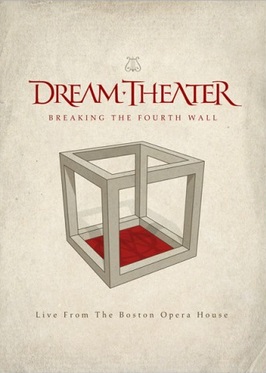
It has been quite some time without a live album hasn't it? This one is especially important since it's the first to feature Mangini.
As per usual, this release lasts for 2h30 with a damn good set list. With "The Enemy Inside", "The Shattered Fortress", an extended version of "Enigma Machine" with a really cool drum solo, "Illumination Theory", the entire second half of Awake and a few tracks off of Metropolis Pt.2, there's quite a lot of good stuff in here. There are of course a few tracks I'm not too fond of, namely "On The Backs Of Angels", "The Looking Glass" and "Along For The Ride", which is quite a low amount of not enjoyable stuff, the set list is hence more than solid.
And of course, as usual, it's played flawlessly, there are some bits added here and there blah blah blah you know all of that, although I actually think there's a fuck-up at some point. In "Lie", LaBrie starts singing in the middle of a solo, I don't know if it's on purpose or not since he does not stop, but I felt like pointing it out. Talking about LaBrie, his vocals here are really good, I enjoyed them on the whole release and they really get to shine on the Awake tracks. The production, however, isn't all that great; it actually reminds me a lot of the self-titled in the way that the bass pops up quite a lot but everything else is really muffled.
This is simply put a pretty nice live record, worth listening to for some of the tracks here that they don't play very often, like "Space Dye Vest" or "Illumination Theory".
And then they made this.
It had been a while since the band had tried to ramp up their ambitions for an album, almost 15 years to be more precise, with the release of Six Degrees Of Inner Turbulence. But this time, they were ready to go above and beyond, with no less than a 2h10 long album. And the only question I can ask is WHY???
The problem is not the length of the album, but the fact that almost nothing in those two hours keeps your interest. There are of course moments of brilliance, as with "Three Days" and its rather surprising trumpet solo at the end, or "The Path That Divides", but all these tracks are lost within the album, and they represent maybe 30 minutes or so out of the 130 if I'm being optimistic. It's insane how uninteresting they managed to make this output, and it is not helped by the fact that most of it is... ballads. Oh god. It becomes quickly unbearable, and the several listens I had to put myself through left me with a severe trauma that might take months to repair.
There's genuinely practically nothing that justifies the length of the album. The songs are all so bland and less than enthralling that I just end up forgetting about them five minutes after they're over. And for once they opted for way shorter tracks, a lot of them being around the three-minute mark, but since they don't particularly distinguish themselves from one another it ends up being a rather terrible choice, as we are now faced with dozens of short tracks that all sound the same and all are boring. I'd have to admit though that it's a pretty solid release concept and story wise, but my god the name of these characters... seriously, Lord Nafaryus? That's some Scooby Doo tier naming, cannot believe they went with that.
This is an utter failure in every way, and I genuinely cannot believe they were happy enough with their work to go "yeah this is awesome" and release it.
But thankfully, after their disastrous last output, Dream Theater decided to play it safe.
Nothing is new here. The ambition has been enormously toned down, the album isn't even an hour long and the longest track doesn't even reach the 10-minute mark. And yet, everything is pretty nice! Nothing is groundbreaking, but every track is at the very least enjoyable. It's one of the record's biggest strength, making it overall simply very solid. "Untethered Angel" and "Pale Blue Dot" are definitely my favorite tunes, although "Barstool Warrior", "S2N" or "Room 137" aren't too bad either. The only tracks that feel a bit weaker from the rest are "Fall Into The Light" and "Paralyzed", which are still some pretty okay tracks but nothing really special and interesting.
And that's ultimately this album's biggest flaw, it's nothing too special and feels generic. Listening to individual tracks can be a blast, but listening to the album as a whole is rather tiring. The tracks mindlessly blend together and there's not enough change for it to be consistently enjoyable. And the 56-minute length, which theoretically should help, doesn't really, as it's still quite long for an album with such a lack of variety. And for an album literally called "speed", Distance Over Time lacks a lot of that, with too many mid-paced moments. But of course you still have your really cool solos, riffs, all that you can ask for, it's there. Even the mix, something Dream Theater hadn't gotten really right in a while, is pretty good here. And a last positive for the album is the bonus track "Viper King", it's a more hard rock-ish track and is pretty different from Dream Theater's usual style, I like it a lot.
But as a whole, Distance Over Time isn't anything new, and you're most likely going to get bored if you already know the band well, although there are definitively some real bangers in there.
It's been a while since the last live album, and coincidentally the Distance Over Time tour happened on Metropolis Pt. 2' 20th anniversary, meaning that this is no regular live album. For the first time in 20 years, the band would be performing Metropolis Pt. 2: Scenes From A Memory in its entirety... and I got to see them!
Since this is a Dream Theater live album, it's 2h30 long. But with the entirety of Metropolis being played, that doesn't leave much room for other tracks. Couple that with a newly released album that they have to play songs off of and you end up with only two track that are not on Metropolis nor on Distance Over Time. While I love Metropolis tracks with all my heart, having five Distance Over Time tracks is a bit overkill, and I don't think "Fall Into The Light" or "At Wit's End" are more deserving of a spot in a track list than anything off of... I don't know, most of the tracks they've released between 1992 and 2005? Thankfully, the two other tracks are really worthwhile additions that they do not play very often, namely "A Nightmare To Remember" and "In The Presence Of The Enemies - Part 1", attenuating the set list problem a bit.
Other than this particular issue, this is a more than solid release, and although there's nothing really new to get out of it, it's always a treat to hear Metropolis, as well as the two tracks I just mentioned, and even some of the Distance Over Time tracks like "Untethered Angel" and "Pale Blue Dot" that once again prove they're the very best songs on their album.
And of course everything is played perfectly, even LaBrie's vocals are quite good. The only slight issue I have is Mangini going a bit too batshit insane on his drum kit at the end of "Finally Free". Other than that, it's a perfectly fine record and a good addition to their live discography.
And after a quite short absence of only two years, the band's last output (to date) was finally released.
In several ways this is an improvement over Distance Over Time. The first thing of note is that this album is 70 minutes long, and yet it feels shorter than its predecessor. The second thing of note is that there are less tracks than on the last record, meaning that yes, the scale and ambition is back. And once again, consistency is on the menu. Of these seven tracks I would only skip "Invisible Monster". Every song here feels different from the rest, yet coherent within the album, they're all quite well made and offer us some neat variety.
However, the major gripe I have would be the pacing. A lot of the songs feel too slow; I want some fast headbangable riffs when listening to Dream Theater, and this album lacks a lot of that. I might even like Distance Over Time's more compact songwriting, although A View From The Top Of The World feels more diverse and less daunting to listen to. The only song with a massive banger of a riff was "A View From The Top Of The World", and it comes really late in. This title track, as well as "The Alien" and "Sleeping Giant", really stand out compared to the rest of the album, although they could hardly compete with the best songs Dream Theater ever released. The production is on point though, and we can actually hear the bass, which is bloody awesome.
Okay, you now know Dream Theater's catalog very well, but you still want more. Where do you go next? Well, my friend, rejoice, for the members of the band are very prolific. If I were to just name every project Mike Portnoy has been in, it would take half of the article, so let's just focus on what are in my opinion the very essential ones, as well as some more original picks.
Liquid Tension Experiment is a band made of Petrucci, Rudess and Portnoy, who are accompanied on the bass, not by John Myung, but by Tony Levin of King Crimson fame. It's a completely instrumental and mostly improvised project. After a really good debut in '97, they diminished the amount of improvised bits and went for something more coherent, and more "metal", since this album was released in '99, the year of Metropolis Pt. 2.
One of Liquid Tension Experiment's key strengths is the variety we're provided with, as there is a non-negligible amount of jazz (pretty much every track has a jazz section), as well as some pretty experimental parts (e.g. in "Chewbacca"), but also some very Dream Theater-esque moments in most of the tracks like "Acid Rain" (very close to Metropolis in several areas) or "Biaxident" (which at times reminds me of "About To Crash"); all these influences culminate in the wonderful 17-minute epic "When The Water Breaks". It seamlessly flows from section to section with all of them being just genuinely awesome and engaging, much like most [band]Dream Theater[band] epics do, and that is something that actually applies to the entirety of Liquid Tension Experiment 2.
The 73-minute run time goes by pretty quickly, and it's very rewarding to listen to. If you're a Dream Theater fan, or someone who loves the band but can't bear LaBrie's vocals (I know that's the case of a lot of people), Liquid Tension Experiment is made for you.
I briefly mentioned Portnoy's plethora of side projects; well, this is one of the first ones he was part of. A pretty regular progressive rock band, featuring on bass Marillion's very own Pete Trewavas, The Flower Kings's Roine Stolt on guitar and Spock's Beard's former frontman Neal Morse on vocals and keyboard, it features an absolutely all-star line-up. And they did not disappoint.
Despite the length of the tracks here (two of them reach the 25-minute mark), there is close to no boring moment to be found on this release. The pacing is on point, and the longer tracks are expertly crafted. The shorter ones end up being the least noteworthy ones, with the five minutes of "Bridge Across Forever" easily the most skippable of this whole output. The obvious highlight of the album is the astounding "Stranger In Your Soul", which manages to keep your interest for no less than thirty minutes, something quite impressive. Bridge Across Forever might not have flashy insanely complex parts, but it's not straightforward either and there are some really cool instrumental sections to be found in there (which is to be expected with 25-minute long tracks), and the experience stays engaging all throughout. I'd also add that the mix is a treat for the ears, genuinely one of my favorite production jobs of all time.
This is an all-round great release and a very ambitious one that succeeds at nearly everything it tries, definitely a must-listen for people who enjoy Dream Theater or prog in general.
And that's it for the side projects. I've come to the realization while writing this that I had much more fun listening to the releases with less Dream Theater involvement, so they're the ones I'd want to share in priority. Of course there's a lot of fun to be had listening to John Petrucci, James LaBrie, OSI and whatnot, so feel free to go check these projects out as well.
You might be wondering what an all-women heavy/thrash band from the 80s is doing in this article. Well, the answer is simple: of the five women in this band, three married Dream Theater members!
They may love Dream Theater members, but on the musical side of things they're for sure not playing prog. Rather than Rush and Queensrÿche, Meanstreak seem to be influenced a lot by Iron Maiden, Judas Priest and thrash in general. The opener of the album is a very standard thrash song with nothing really too innovative happening, while most of the rest of the album is closer to Iron Maiden-esque by-the-numbers heavy metal, even with some more early power metal à la Helloween tracks here and there.
The playing is definitely sloppy at times, and the solos are less than fantastic (bar the one in "It Seems To Me", which was really good), but Roadkill is undeniably catchy, and Bettina France's vocals absolutely slay and definitely are the highlight of this record. This output is far from very original, but it's just some really fun heavy/thrash from the 80s that, while by no way straying from the norm, still stays enjoyable all throughout. It's also an important historical piece, as Meanstreak may have been the first ever woman-only thrash band. I definitely recommend it to anyone who enjoys heavy or thrash from the 80s.
Behold The Arctopus is definitely not a name I thought I'd mention in this article... but Jordan Rudess makes a short continuum solo at the very end of this album, so it technically counts!
If you've ever heard of this band, it's for one thing: they're insanely technical and chaotic. Just so you realize how much of an all-star line-up there is on this album, bassist Colin Marston would later join Gorguts and found Krallice and Encenathrakh, while the drummer would join no less than Blotted Science, and all of these bands are either insanely technical, chaotic, or both. Well, Skullgrid doesn't lack any of that. There are some incredibly weird and chaotic moments, where each instrument sounds like it plays some random stuff completely separate of the rest, and yet these moments always lead to everything coming back together, and one of this album's biggest strengths is how amazing the sections where everyone plays together are.
Unlike what you may think, there are some very melodic moments in this effort; the chaos even feels a bit restrained compared to what the band's debut EP, Nano-Nucleonic Cyborg Summoning, offered, leading to Skullgrid feeling rather balanced, which makes the release as a whole much more enjoyable (something the band's subsequent releases, bar the last one that does something completely different, would fail to do). Skullgrid also presents some surprising variety here and there like the dreamy clean section in "Canada" that serves as a nice break before getting back to the brain melting mayhem, or Rudess' guest appearance on "Transient Exuberance" that adds a lot to the track.
In the short thirty minutes the album lasts, a lot happens, maybe even too much for some. But if you can appreciate their challenging style, Behold The Arctopus may deliver with Skullgrid something you'll never experience anywhere else, and it's a damn great experience.
[hb]
Thank you for getting all the way to the end of this article. As a reward, here is James LaBrie saying Big Chungus.
Guest article disclaimer:
This is a guest article, which means it does not necessarily represent the point of view of the MS Staff.
This is a guest article, which means it does not necessarily represent the point of view of the MS Staff.
Comments
Comments: 21
Visited by: 187 users
| musclassia Staff |
| Roman Doez Hallucigenia |
| RaduP CertifiedHipster Staff |
| JoHn Doe |
| Roman Doez Hallucigenia |
| RaduP CertifiedHipster Staff |
| JoHn Doe |
| Nejde |
| Roman Doez Hallucigenia |
| SoUnDs LiKe PoP Posts: 1060 |
| Oracles |
| Oracles |
| Bad English Tage Westerlund |
| AndyMetalFreak A Nice Guy Contributor |
| RaduP CertifiedHipster Staff |
| AndyMetalFreak A Nice Guy Contributor |
| Piledr1ver Posts: 14 |
| Enemy of Reality Account deleted |
| Dream Taster The Enemy Within Staff |
| 24emd Theory Snob |
| Tom Muller |
Hits total: 3200 | This month: 42





















